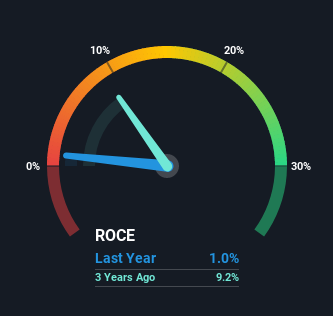- United States
- /
- Professional Services
- /
- NYSE:TBI
TrueBlue (NYSE:TBI) Has Some Difficulty Using Its Capital Effectively

To avoid investing in a business that's in decline, there's a few financial metrics that can provide early indications of aging. More often than not, we'll see a declining return on capital employed (ROCE) and a declining amount of capital employed. Ultimately this means that the company is earning less per dollar invested and on top of that, it's shrinking its base of capital employed. Having said that, after a brief look, TrueBlue (NYSE:TBI) we aren't filled with optimism, but let's investigate further.
What is Return On Capital Employed (ROCE)?
For those that aren't sure what ROCE is, it measures the amount of pre-tax profits a company can generate from the capital employed in its business. The formula for this calculation on TrueBlue is:
Return on Capital Employed = Earnings Before Interest and Tax (EBIT) ÷ (Total Assets - Current Liabilities)
0.0099 = US$7.1m ÷ (US$979m - US$258m) (Based on the trailing twelve months to March 2021).
So, TrueBlue has an ROCE of 1.0%. In absolute terms, that's a low return and it also under-performs the Professional Services industry average of 10%.
See our latest analysis for TrueBlue

Above you can see how the current ROCE for TrueBlue compares to its prior returns on capital, but there's only so much you can tell from the past. If you'd like to see what analysts are forecasting going forward, you should check out our free report for TrueBlue.
What The Trend Of ROCE Can Tell Us
We are a bit anxious about the trends of ROCE at TrueBlue. The company used to generate 11% on its capital five years ago but it has since fallen noticeably. What's equally concerning is that the amount of capital deployed in the business has shrunk by 25% over that same period. The combination of lower ROCE and less capital employed can indicate that a business is likely to be facing some competitive headwinds or seeing an erosion to its moat. Typically businesses that exhibit these characteristics aren't the ones that tend to multiply over the long term, because statistically speaking, they've already gone through the growth phase of their life cycle.
The Key Takeaway
In short, lower returns and decreasing amounts capital employed in the business doesn't fill us with confidence. In spite of that, the stock has delivered a 37% return to shareholders who held over the last five years. Either way, we aren't huge fans of the current trends and so with that we think you might find better investments elsewhere.
On a final note, we've found 1 warning sign for TrueBlue that we think you should be aware of.
For those who like to invest in solid companies, check out this free list of companies with solid balance sheets and high returns on equity.
If you decide to trade TrueBlue, use the lowest-cost* platform that is rated #1 Overall by Barron’s, Interactive Brokers. Trade stocks, options, futures, forex, bonds and funds on 135 markets, all from a single integrated account. Promoted
Valuation is complex, but we're here to simplify it.
Discover if TrueBlue might be undervalued or overvalued with our detailed analysis, featuring fair value estimates, potential risks, dividends, insider trades, and its financial condition.
Access Free AnalysisThis article by Simply Wall St is general in nature. It does not constitute a recommendation to buy or sell any stock, and does not take account of your objectives, or your financial situation. We aim to bring you long-term focused analysis driven by fundamental data. Note that our analysis may not factor in the latest price-sensitive company announcements or qualitative material. Simply Wall St has no position in any stocks mentioned.
*Interactive Brokers Rated Lowest Cost Broker by StockBrokers.com Annual Online Review 2020
Have feedback on this article? Concerned about the content? Get in touch with us directly. Alternatively, email editorial-team (at) simplywallst.com.
About NYSE:TBI
TrueBlue
Provides specialized workforce solutions in the United States, Canada, the United Kingdom, Australia, and Puerto Rico.
Very undervalued with adequate balance sheet.

